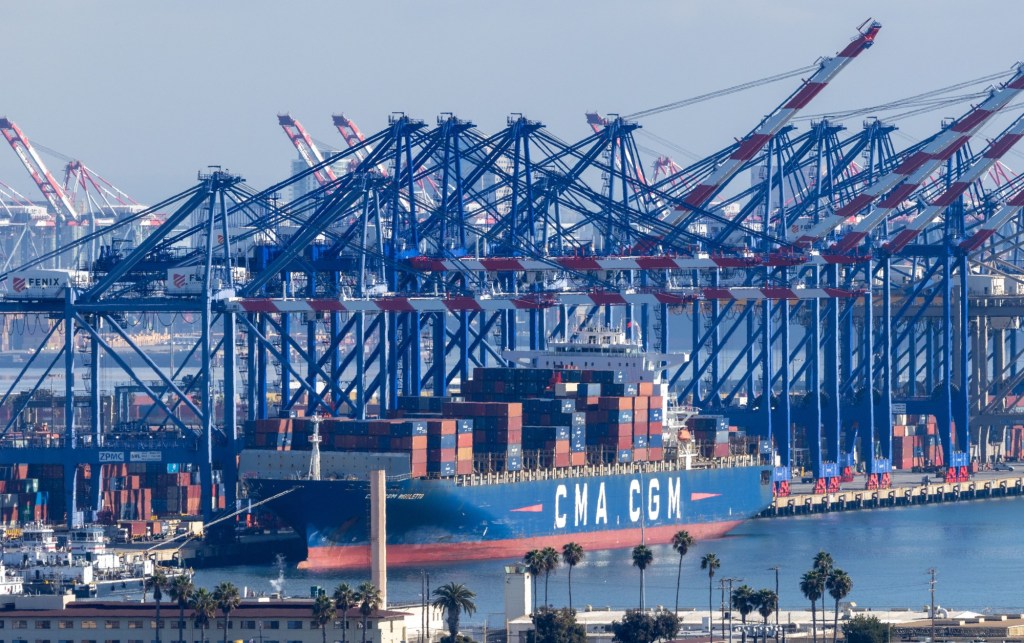The ports of Los Angeles and Long Beach, and the Air Quality Management District have made progress on reaching an agreement over a proposed rule by the latter — the Indirect Source Rule — that would require the two ports to develop a plan by August 2027 to build charging and fueling stations to switch thousands of pieces of diesel equipment, trucks and vessels to electricity and hydrogen, officials said on Friday, Sept. 19.
On July 18, the cities and the ports of Long Beach and Los Angeles provided a draft Cooperative Agreement to the South Coast AQMD, a representative from the environmental agency said in a written response to questions. Discussions over the past 45 days have resulted in a consensus on an updated draft Cooperative Agreement, the AQMD said.
Negotiations with the ports to address concerns have been ongoing and a public meeting will take place in October to gather public input on the draft agreement with the ports.
AQMD will continue discussions, a representative said, but “at this time, no final decisions have been made.”
The direction from Friday morning’s Mobile Source Committee meeting asks that the item be brought to the committee for an update on Oct. 17 and then to the Governing Board for final approval in November.
The ports, meanwhile, have already made progress in cutting emissions and transitioning to low- and zero-emissions equipment. But they have also raised concerns that the AQMD’s proposal would effectively require caps on cargo going forward.
But officials from both ports, in a joint statement, expressed optimism about a collective agreement.
“Today’s vote by the Mobile Source Committee is recognition that the collaboration between the ports of Los Angeles and Long Beach and the South Coast Air Quality Management District produced a strong agreement that can serve as an alternative to Proposed Rule 2304,” the joint statement said. “We remain committed to this collaboration as the public reviews the agreement and we look forward to taking a final agreement forward for approval by our respective boards before the end of the year.”
The Pacific Merchant Shipping Association, representing and advocating on behalf of marine terminal operators, ocean-going vessels and maritime industry stakeholders doing business at U.S. West Coast ports, issued a long and enthusiastic statement expressing its support.
“PMSA applauds the Air District for successfully reaching consensus with the Ports and City leadership on all of the main points for a Cooperative Agreement,” Mike Jacob, president of the Pacific Merchant Shipping Association, said in a written statement. “We commend the Air District Board and Staff for their work towards the adoption of an agreement and appreciate the ongoing leadership and support of Mayor Karen Bass, Mayor Rex Richardson, and the Ports of Los Angeles and Long Beach.”
But the issue is far from settled and still needs to go through more vetting. It essentially reflects the opinion of the AQMD staff on the committee working with the ports to find a resolution. While seeing progress, the collective agreement under discussion is far from a done deal.
The AQMD Indirect Source Rule carries strict provisions, with the goal of ensuring that the Los Angeles and Long Beach ports can achieve the clean-air goals they set for themselves back in 2017.
Those goals include converting 100% of the ports’ diesel cargo-handling equipment — such as tractors and giant, 60-foot cranes that move containers — to zero emissions by 2030 and for all drayage trucks, which haul the ports’ containers of cargo to warehouses, to run on electricity or hydrogen by 2035.
Both ports continue voluntarily working toward those goals under their joint Clean Air Action Plan.
But the deadlines are looming. And a report issued a year ago by a group of USC researchers said the goal of switching all drayage trucks to ZE vehicles remains especially challenging.
The report, which was released on Sept. 6, 2024, said quickly building more charging and fueling infrastructure, and creating a secondhand market for ZE trucks — to lower the current price tag — are among the challenges the ports face. Commissioned by the Los Angeles Business Council Institute, the report titled “Navigating California’s Transition to Zero-Emission Drayage Trucks” said transitioning the fleet remained challenging.
The main points under discussion for a collective agreement between the ports and AQMD include provisions for setting “triggers” for violations that would include financial consequences and establishing a process to determine how to spend money collected from violations. The current proposal also would preserve South Coast AQMD’s ability to make decisions on rule-making in the future.
